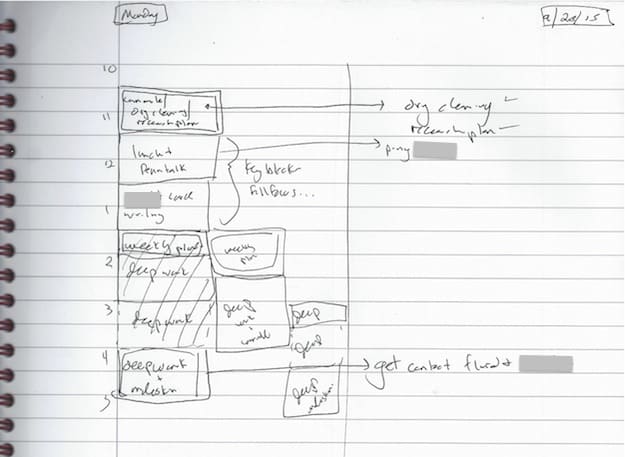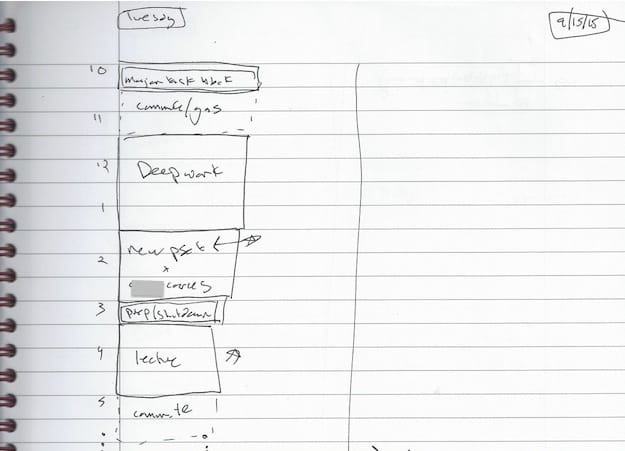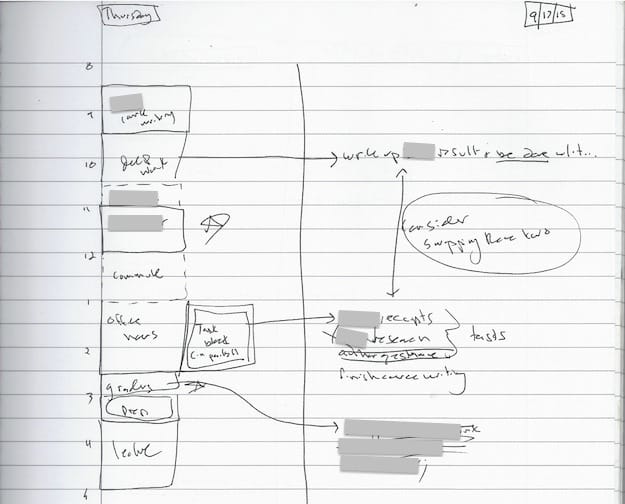
A Blocking Believer
Longtime Study Hacks readers know I’m a proponent of planning in advance how you’re going to spend your time. To this end, each morning I block out the hours of my work day in one of my trusted Black n’ Red notebooks (see above), and assign specific efforts to these blocks.
My goal, of course, is not to make a rigid plan I must follow no matter what. Like most people, my schedule often shifts as the day unfolds. The key, instead, is to make sure that I am intentional about what I do with my time, and don’t allow myself to drift along in a haze of reactive, inbox-driven busyness tempered with mindless surfing.
Though the basic idea behind daily planning is simple — block out the hours of the day and assign work to these blocks — many readers ask me good questions about the details of its implementation. In response to these queries, I thought it might be useful to show you a few of my actual daily plans from recent days during this past month…
The Triple Rewrite

Notice, this plan doesn’t start until 10:30. This doesn’t mean that I started work at 10:30. On many days, I like to dive right into a deep task for an hour or so before taking the time to make a plan for the rest of the day.
The columns growing to the right side are rewrites that I made throughout the day as my plan changed. Someone stopped by my office during the 12:30 block to discuss a research problem, which shifted the length of my 1:30 task block. But even that shift was not enough as that block ended up lasting until 3 — requiring yet another rewrite of the plan.
Also, notice how I use the right hand side to elaborate the details of some of my blocks.
A Well-Oiled Teaching Day

Here’s an example of a teaching day unfolding efficiently. After an early morning block of work (not captured on the plan), I batched some key tasks before commuting to work. I then immediately carved out two hours of deep work before turning my attention to updating the problem set I needed to post that day. From 3 to 3:30 I reviewed my course notes and did a final shutdown pass before heading to teach my 3:30 class.
Notice, an implication of this schedule is that between 10:30 and 3:00 I never saw my e-mail inbox.
Salvaging A Fractured Day

I actually wrote this Thursday plan the night before, so you can see the whole day laid out. Like most mornings, I start work at 8:30. In this case, I dived straight into a difficult course related task before turning my attention to deep work (which, for me, is almost always code for “working on research problems”).
The grayed out blocks that follow involve me taking my youngest son to a doctor’s appointment — a disruptive task from a scheduling perspective. But notice how my use of daily planning allows me to salvage every ounce of productivity from the day. Not only did I get a lot done before I left, but on arriving at campus, I was ready to inline core tasks into the down periods that arose during my regularly scheduled office hours.
I then had a grader’s meeting and some final preparation for my lecture before heading off to teach.
On the right hand side you’ll see an elaboration of what tasks I planned to complete during my task block as well as a suggestion that I might consider swapping the deep work block with the task block (in the end, I didn’t).
A Few Closing Notes
My goal in showing the above examples is to demonstrate the mundane reality of daily planning. It’s not a super secret system, and it can be messy (especially if your handwriting is as bad as mine), but it’s still absurdly effective at insuring that at the end of each week you look back and are proud of what you accomplished.

Nice to see screenshots of your notes. They immensely reinforce the ideas and concepts expressed in the write-up.
I like the spacing and aesthetical balance of the pages.
Don’t you use any app for planning, tracking and create habits?
Cheers
Impressed on how much you can achieve without using an app or smart phone. Sometimes we limit our beliefs to the absence of some digital products to plan effectively. You are proving that effective scheduling can be done through use of hand notes. Well done Cal !
People forget how flexible paper-based planning is…there is so much you can do in terms of formatting, connections, systems…I’m a big paper booster.
Fascinating. Ironically, using paper to plan seems like a novel idea. It has taken me over a year and a half of wrestling with Outlook tasks for it to kind of do what I want. The main advantage it has over paper is how quickly you can turn an email into a task if desired….and how you can have that task pop up at a certain date in the future. But it can lead to “scope creep” where everything becomes a future task.
I also tried to use Outlook tasks, but they’re treated as a second-class feature in Outlook and are just too unwieldy to use. Now I just make check-boxes in OneNote and spend a little time each morning blocking off time in Outlook to deal with each task (see the article I linked to in another comment elsewhere on this page).
I’ve been almost entirely paperless for years, except for occasional scribble sessions when designing something, and I can’t bear the thought of going back.
I almost gave up on Outlook tasks but I finally had a breakthrough in learning how to set it up just right about 8 months ago and it literally changed my life.
Daniel…can you point to sources where I can find information on setting up a outlook the way you did ? Thanks
pat
There are several very good to-do list programs that interface with Outlook (and are way better than Outlook tasks). For instance, my personal favorite is Todoist. It works on every platform you can think of, and has a plugin for Outlook so that you can instantly turn an email into a task. Todoist also has a clean interface and isn’t too complicated, so that you can focus on actually DOING things rather than working with the software 🙂 Combine some app/program like Todist with a “getting things done” strategy and Cal’s daily planning, and you’ve got yourself a heck of an efficient system!
I tested out Todoist and it was pretty good. When I tried it the sorting of tasks didn’t save correctly across all platforms. That was about 6 months ago and I have heard that the sorting has been improved.
As of 6 months ago, I found Outlook tasks to be much more powerful.
@Pat, the way I have Outlook tasks set-up is custom – using the “view” settings on the “today” view. I’ve thought about making a youtube video about it – because it is complicated to get right at first. Once you figure it out though – it is powerful
Yes Faisal, I’m too impressed with what Cal is achieving while not giving a damn about all the silicon valley products. Feeling guilty here having to always rely on my mobile phone to remind or plan anything.
The simple act of planning on a notebook is more powerful and definitely engaging!
Thank you Cal as always…
How many notebooks are you actively using at any given time? Is your daily planning in a notebook of its own? Do you have other notebooks for other things (meeting notes, research notes, or whatever?) Or do you keep everything in a single notebook?
I tend to have three distinct kinds of content: (1) daily schedule / time blocking, (2) project plans and to-do lists, and (3) notes from meetings, reading, research, etc. There are pros and cons for keeping a single notebook vs. multiple notebooks, and I don’t have a clear preference, so I find myself switching back and forth, never satisfied.
Do you have any thoughts on high-level organization of notes?
I have three notebooks: my planning note book (the Black n’ Red shown above), a research notebook (a standard, school kid grid line composition notebook), and a big idea/observation note book (a moleskin).
“I have three notebooks: my planning note book (the Black n’ Red shown above), a research notebook (a standard, school kid grid line composition notebook), and a big idea/observation note book (a moleskin).”
Where do you keep your task lists – is it only Google Tasks? Same for your calendar, via Google? Elsewhere you also mention keeping weekly and quarterly planning notes. I am attempting to implement this and would appreciate a little more granularity to the process. Thanks, Cal!
> On many days, I like to dive right into a deep task for an hour or so before taking the time to make a plan for the rest of the day.
That’s also a good way to avoid getting distracted by morning emails sent by early-risers.
Thanks, Cal. For me, using the calendar in Microsoft Outlook to plan and then adjust my day is a little easier and tidier, because my colleagues use Exchange to schedule meetings, and it’s easier to see what’s already planned and schedule around those meetings. It’s also easier, for me at least, to adjust plans on the fly with a couple of clicks and drags.
I wrote a LinkedIn article a while back about how I implement your idea (and gave you due credit):
https://www.linkedin.com/pulse/how-i-plan-every-minute-my-day-stay-productive-paul-parks
Thanks, Cal, and keep up the good work!
Very much reminds me of the Emergent Task Planner from David Seah.
https://davidseah.com/node/the-emergent-task-planner/
Hi Cal,
Do you ever return to earlier planning notebooks? Why? I’m curious to know if there is value in keeping them and how you use them later.
Thanks Cal. Love your work.
I haven’t gone back to them yet. But I have this vague suspicion that one day there will be some really useful analysis they will enable, so I keep them just in case…
Great!
Have been using getting things done for a while. But the tasks keep piling. I think i will schedule all tasks in my calendar.
I have finished Bachelor degree in Mechanical engineering and I’m currently working as a design engineer based on CAD. Now I want to prepare for an entrance exam, to do M.Tech., majoring Design, in the Indian Institute of Technology, which I think is the best option for me now to get a strong career capital in my field. Since I’m working now from 10 to 6, how can I assign time for my exam preparations? I will take that exam on Feb, 2017 and it is one of the toughest exam to crack in India. So I need more time for preparing. I’m eager to know your opinions. Thanks
Weekdays:
6am to 9am
Then 7p-11p
Weekends can more flexible
Just an option. Good luck with your exam! Heard the IIT schools are some of the best
Hi Cal,
Seeing your son’s doctors appointment in your schedule makes me crave your thoughts on maintaining (increasing?) productivity while parenting young children. As a PhD student with a 6-month old baby who’s trying desperately to work on her dissertation, I’d love to hear how you manage your balance of work and child-rearing. There are admittedly gender differences and perhaps you have a partner who doesn’t work or full-time childcare? Would love to hear more.
Thanks for this wonderful blog!
As a 4th year PhD student contemplating on starting a family or not, I’d like to get in touch with you to ask about your experiences as a Mom and as a PhD student. Please let me know how to get in touch with you.
Thanks
Hi,
I got a daughter while I was a second year PhD. Finding a good day care was well worth the investment to have 8hrs a day to practice “fixed schedule” productivity. I managed to get my PhD on time without working at night or in the weekends.
Good Luck!
Hi sorry – just seeing this – you can email me at [email protected]
Hi Cal,
Apologies in advance, but I didn’t know where else to post this since you don’t accept direct e-mail. I’m devouring your top-notch book (I wish it came along with a certain famous lifestyle design book as a reality check to the inherent problems of lifestyle design without enough career capital) and noticed your story about Lisa the marketer-advertiser who tried a yoga business.
What I realized is that she probably DID have the career capital to make it work – if and only if she would have taken the bird’s eye view and started the business as the CMO and partnered with some type of CEO with studio management experience (someone with complementary career capital). Maybe even a yoga teacher who knew the admin side would have been enough Then she would have leveraged her marketing campaign strengths and with the help of validation and unique positioning (key skills for marketers), she would have proven a potential yoga studio business concept.
Lisa wouldn’t have been the teacher from day one, but the owner/ co-owner of the studio (better in my humble opinion). And once she got the business to a profitable point, she could have learned and dabbled in teaching on the side to the point of building teaching capital over time in her own business. With that said, as a CMO, she might have dropped the teaching idea entirely over time if the studio was successful.
Another idea that could have saved her a lot of grief was just trying to get an evening gig as a yoga teacher or a gig as a freelance yoga teacher for private sessions without quitting her job.
Could you comment (here or perhaps a future post) about the mechanics of how you actually construct your schedule?
I’ve been using your method fairly successfully by first placing time sensitive blocks, then filling in the remainder by choosing the one or two most important deep work items and assigning them, and finally filling in the remaining little gaps with email type tasks, adjusting my other blocks if necessary to give this shallow work the minimum time needed. This works reasonably well, but I’d love to make it stronger by hearing how your mechanics might differ.
Hey Cal. Thanks for posting this. I have recently adopted the same daily ritual and I love the system because it leaves room to be flexible for things that change.
A few additional items that I have adopted.
0. I take 15 minutes before I sleep to log insights/results of my day (when I was inefficient and why). I also bullet point the major accomplishments of the day (deep work, high-impact project). Finally, I condense these every week to give me a snapshot of how effective I am in spending my time and if I’m making progress towards my goals.
1. I plan a sprint every 2 weeks. Here I reevaluate my goals and set milestones for the next 2 weeks. I also review my weekly notes and determine if there are any trends/patterns that I’m noticing. This allows me to refocus on what is important and figure out if there any bad habits I need to address in my next sprint.
Overall, I have felt that I found my sweet spot in terms of reflection and analysis.
A quick question. How do you reconcile the daily planning ritual with your autopilot schedule? In theory, the autopilot schedule is supposed to take care of all your daily planning. That said, I find that I deviate quite often from the autopilot schedule I laid out for the semester simply by virtue of one’s whims and changing responsibilities. I’m curious how you mesh together this new daily planning ritual and your previous ideas on the autopilot. Any thoughts?
often I got scared by the idea of daily planning. Why, very simple, when I plan it out, the scarce amount of hours that I can use in a day scares me.
Well, I need to learn to face it, and get the most out of it. Thanks for the post!
I feel that this is a great entry in regards to planning and organizing an individuals life. I personally have always used a planner because of my mother who taught me to always plan every minute of your day. My Mom is literally the busiest person I know and she accomplishes everything she sets her mind to, specifically because she writes everything down in an organized fashion. Because of this example in my life, I have a strong belief in time-organization. It’s not necessary to spend a lot of money on a planner if the means are not present. Just as you did, anyone can take a simple sheet of paper and make their very own schedule. I also feel very strongly, that having a visual of your day, week and/or month planned out, it ignites motivation to accomplish all you can!
Hi Cal
I’ve been reading your blog since I was a college student and loved applying your techniques to my studying and was a great student (or at least I tried to) However, I finished college last year and started working at my first job. I’ve been struggling ever since to adapt these ideas at work, because I just don’t have the same autonomy I had as a student.
There is a lot of unsaid social pressure to toe the line around responding to emails, wasting time in meetings all day (!), being available on instant messenger, and even staying till late in the office. On top of it, the work isn’t really that challenging, so it doesn’t offer that many opportunities for ‘deep work’ or even growing skills ( I am aware of the irony of saying this after only one year of working!)
I used to earlier finish all my work by around 5 or 6 and leave, but no one else in my team would leave, and finally I sort of gave in, worrying that everyone will think I don’t do enough work (or worse- they will start loading me with more work because they think I am free :/ )And so some days I often find myself violating my own principles by spending my time in unproductive ways (attending useless meetings for instance) because this way at least people think I am working.
However now I consistently feel miserable because I feel like I am wasting so much time. I feel even more miserable because as a student I never even thought about how people might perceive me, but at work I feel like I had a really tough time because I didn’t care enough about ‘perception management’. But on the other hand it feels very phony and wrong to me to worry about things like perception management.
Anyway, I guess I am just feeling particularly miserable today. I’ll figure a way out.
Hey Lizlem,
I was wondering if you’ve figured out a solution?
Your comment felt as though I could have written it myself. The pressure to be on instant messenger all day, every day, is definitely there. I found I can get away with closing Outlook to avoid email interruptions for periods of time, but being “offline” on IM looks bad.
I have also felt the pressure to manage perceptions. Deep work may not look like real work to some, if they walk by your cubicle and you’re sitting there in deep though, but not actively *doing* something, such as typing, or on the phone, or actively engaged with some sort of SW. So I find myself pretending to DO stuff so I don’t look bad…. and the irony is I look like I’m working, but I’m really not.
It’s SOOO frustrating! If Cal would weigh in on this, that would be amazing.
Sam
Cal,
Thanks for sharing this. Do you keep all these notebooks and later reflect how you spent your time?
Thanks.
Hi Cal,
now or previously have you used the same scheduling method for ‘work’ or ‘projects’ in the evening outside of work hours? If not, how did you schedule this? For example when you were creating your recent course with Scott, did you have a block from 7-8pm to create a presentation for lesson 1?
I’m using you method for my workday but I also try to push myself further in the evening by completing courses, creating a professional website etc. Would you continue to use the same method?
Thank you,
Nick
thanks this is really helpful
Hi Cal!
I wonder, when do you find time to eat in your schedule? Do you use that time somehow (and then consider eating as distraction), you don’t eat during working hours (well, how do you do this?) or is it time to reset mentally and take longer break (isn’t longer break destructive for deep focus?)?
Thank you for your great blog!
Piotr
Cal, love you man but your handwriting needs deep work!